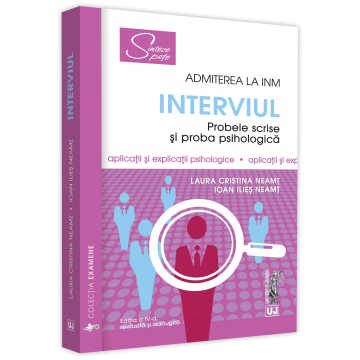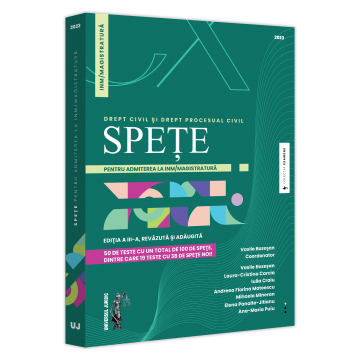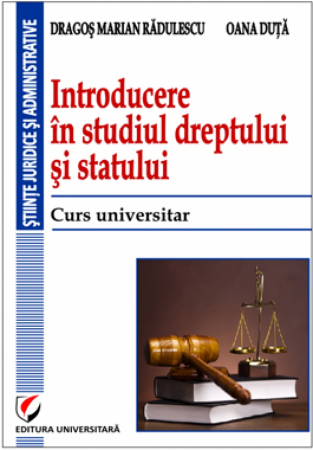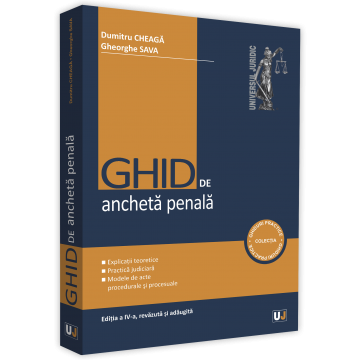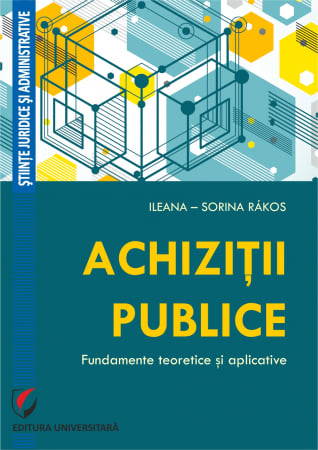6359.png) Reimbursement of Medical Expenses Incurred in Another Member State of the European Union. Collection of Judicial Practice
Reimbursement of Medical Expenses Incurred in Another Member State of the European Union. Collection of Judicial Practice
Publisher: Editura Universitara
Author: Dragos Calin, Roxana Maria Calin
ISBN: 978-606-28-1133-4
DOI: https://doi.org/10.5682/9786062811334
Publisher year: 2020
Edition: I
Pages: 340
- Description
- Download (1)
- Authors
- Content
- More details
- Where to find it
- Reviews (0)
-
Reimbursement of Medical Expenses Incurred in Another Member State of the European Union. Collection of Judicial Practice
Download
ROXANA MARIA CALIN, judge, Bucharest Tribunal
Foreword / 11
Insofar as it is proved that the medical emergency prevented the applicant not only from obtaining prior authorization, but also from submitting the application for prior authorization, the national legislation cannot constitute an impediment in granting the value of medical treatment according to the provisions of art. 20 of Regulation (EC) no. 883/2004. / 17
Timisoara Court of Appeal, Administrative and Fiscal Litigation Section, Civil Decision no. 7779 of November 7, 2017
As the applicants have not submitted any document showing that the Romanian medical institutions could not carry out the surgery performed in Austria properly or within a reasonable time, the value of the medical treatment cannot be granted / 75
Timisoara Court of Appeal, Administrative and Fiscal Litigation Section, Civil Decision no. 925 of May 8, 2018
By paying the medical treatment by the plaintiff, the form S2 (E112) no longer produces the effects for which it was issued, and cannot be invoked in the request for reimbursement. These provisions are applicable in all situations, not only in the issuance of the form after the departure of the beneficiary, as the purpose of its issuance is the same in all situations, respectively for the beneficiary to obtain medical treatment from a unit in another state, without incurring its cost, the equivalent value of the medical services will be settled directly between the institutions involved. If the value of the medical services was paid by the beneficiary, the form no longer produces the effects for which it was issued, respectively the direct settlement of the medical services between the medical unit and the health insurance house, without the beneficiary's contribution / 126
Tirgu Mures Court of Appeal, Civil Section II, of administrative and fiscal contentious, Decision no. 666 / R of October 11, 2016
The provisions of art. Article 22 of Regulation (EEC) No 1408/71 does not preclude, in principle, a regulation of a Member State which makes the full reimbursement of hospital care expenses granted in another Member State subject to prior authorization. Instead, these articles oppose such a regulation interpreted in the sense that it excludes, in all cases, the full reimbursement by the competent institution of the expenses related to such care, granted without prior authorization / 138
Bacau Court of Appeal, Civil Section I, Decision no. 1521 of October 28, 2013
According to art. 22 of Regulation (EEC) No 1408/71, there is the possibility to travel to the territory of another Member State to receive treatment appropriate to the condition of the insured during illness or maternity, both for the insured and for the family member. The surgery on the fetus has a neonatal urgency that must be performed immediately after birth, and this situation is not compatible with the procedures regarding the registration of the birth and the issuance of the birth certificate in the name of the child / 148
Ploiesti Court of Appeal, Civil Section II, of administrative and fiscal contentious, Decision no. 128 of January 16, 2018
The domestic legislation conditions the bearing of the value of the expenses occasioned by the medical services provided outside the country, by the favorable solution of the request for issuing the form S2 (E112) prior to the beneficiary's departure abroad, only the issuance, as material fact, may be subsequent to departure / 159
Craiova Court of Appeal, Administrative and Fiscal Litigation Section, Decision no. 1630 of March 13, 2014
Failure to recognize the biological mother's ability to obtain birth services in the place where the child was to be performed and the medical act on the child made the insured's rights subject to a formalistic, rigid procedure, to become illusory. The medical report on the child's situation, which noted the need for urgent intervention to save his life, was sufficient to prove that the birth could not be done within a reasonable time in Romania, given the condition of the fetus / 171
Iasi Court of Appeal, Administrative and Fiscal Litigation Section, Decision no. 1683 of November 14, 2017
Given that the E126 form is not processed by the official institutions authorized at the place of residence, within the Federal Ministry of Health and Safety, but only by the provider of medical services, as correctly notified by the defendant, it follows that in this case the liability of the Romanian state could not be engaged under Regulation (EEC) no. 1408/71/180
Timisoara Court of Appeal, Administrative and Fiscal Litigation Section, Civil Decision no. 2877 of April 9, 2014
A condition of the admissibility of issuing the form S2 (E112) is that, from the medical report, it should result that the requested medical service is part of the package are basic services that benefit the insured in the social health insurance system in Romania and this cannot be performed within a reasonable time in any of the health units in Romania, taking into account the current state of health of the applicant and probable evolution of the disease / 188
Oradea Court of Appeal, Civil Section I, Civil Decision no. 96 of January 15, 2014
Hospital care provided in another Member State must be reimbursed by the competent institution within the amount established by the legislation of that Member State, if they have been the subject of the authorization imposed by art. 22 para. 1 letter c of Regulation no. 1408/71. If this amount is less than that which would have resulted from the application of the legislation in force in the Member State of which the resident is insured in the event of hospitalization in the latter State, an additional reimbursement corresponding to the difference between the competent institution must be granted. these two values, within the limits of the expenses actually incurred / 210
Oradea Court of Appeal, Civil Section I, Civil Decision no. 505 of September 18, 2017
Lack of a medical recommendation given by a medical professional who provides medical services in the Romanian health insurance system, in the sense of a robotically assisted surgery. Costs required for reimbursement / 222
Tirgu Mures Court of Appeal, Civil Section II, of administrative and fiscal contentious, Sentence no. 133 of December 30, 2019
From the medical report it must result that the medical services from which the insured benefited are found in the package of basic services (services settled from the National Health Insurance Fund of Romania) and the fact that these services cannot be performed in Romania during time normally required to obtain treatment, taking into account his current state of health and the probable evolution of the disease / 249
Bucharest Court of Appeal, Section VIII administrative and fiscal contentious, Civil sentence no. 409 of February 10, 2017
Reimbursement of medical expenses incurred in another Member State may not be refused if hospital treatment could not be provided in a timely manner in the Member State of residence of the insured person due to lack of basic medicines and medical supplies and infrastructure / 262
Bucharest Court of Appeal, Section VIII administrative and fiscal contentious, Civil Decision no. 5984 of December 13, 2016
The issuance of the S2 form (E112) can be done only in the conditions of the existence of a certain diagnosis and of the impossibility of treating the disease within the Romanian medical system / 290
Cluj Court of Appeal, Section III administrative and fiscal contentious, Civil Decision no. 2107 of November 2, 2016
As long as the plaintiff did not address the institution empowered with a request for the issuance of form S2 (E112), neither before the trip abroad, nor after it, by invoking the situation of force majeure in which he was, which prevented him from requesting the issuance of the form / S2 (E112), there is no legal basis to reimburse the value of medical services provided / 296
Alba Iulia Court of Appeal, Civil Section I, Civil Decision no. 1282 of October 6, 2016
Issuance of form S2 (E112) in case a separation cannot be made between birth and surgery, which is imposed by the malformation from which the fetus suffers, because birth cannot be seen as a disease of the mother / 306
Ploiesti Court of Appeal, Civil Section II, of administrative and fiscal contentious, Decision no. 9169 of October 31, 2013
Not invoking an objective impediment, insurmountable in submitting the application, but only discouraging the applicant, through a verbal communication with the public authorities, that the procedure would not cover such interventions, does not justify the existence of special circumstances, likely to attract the application of the proportionality test. in order to verify the unjustified restriction of the free provision of services / 323
Cluj Court of Appeal, Section III administrative and fiscal contentious, Civil Decision no. 1661 of November 29, 2019
Even if the judicial practice is less numerous and quite unknown, being accessible on the ROLII portal, still, the Romanian courts have twice notified the Court of Justice of the European Union with preliminary references, the jurisprudence practically revolving around the two solutions of the Court of Justice. Justice, following the Elchinov solutions, C-173/09, EU: C: 2010: 581.
By Order of the Court of Justice of 11 July 2013, delivered in Case C-430/12, Luca, ECLI: EU: C: 2013: 467, the reference for a preliminary ruling from the Bacau Court of Appeal was answered as
"Article 49 EC and Article 22 of Regulation (EEC) No Council Regulation (EC) No 1408/71 of 14 June 1971 on the application of social security schemes to employed persons, to self-employed persons and to members of their families moving within the Community, as amended and updated by Regulation (EC) No . Council Regulation (EC) No 118/97 of 2 December 1996, as amended by Regulation (EC) No Regulation (EC) No 592/2008 of the European Parliament and of the Council of 17 June 2008 does not preclude in principle a regulation of a Member State which makes the full reimbursement of hospital care expenses granted in another Member State conditional on obtaining prior authorization. Instead, these articles oppose such a regulation interpreted in the sense that it excludes, in all cases, the full reimbursement by the competent institution of the expenses related to such care provided without prior authorization.
Where a refusal to reimburse, in the absence of prior authorization, the costs of hospital care provided in another Member State and paid by the insured person is not, in view of the specific circumstances, well-founded, the costs of such care shall be reimbursed by the competent institution. insured in question within the amount laid down by the legislation of that Member State. If that amount is less than that which would have resulted from the application of the legislation in force in the Member State of which the resident is insured in the event of his hospitalization in the latter State, the competent institution must grant an additional reimbursement corresponding to the difference between them. two values, within the limits of the expenses actually incurred. Where such a refusal is well-founded, the insured person may claim, under Article 49 EC, the reimbursement of expenses for hospital care only within the limits of the coverage guaranteed by the health insurance scheme to which he is affiliated. '
In the internal litigation, in October 2008, Mrs. Luca had been subjected to medical investigations at the university clinic in Vienna, their cost being 4,822.15 euros. Ms. Luca subsequently requested, on January 26, 2009, the issuance of an E112 form to perform medical treatment at the same clinic. However, she requested, two days later, that the request be postponed. Following a request for reimbursement of medical expenses incurred for this treatment, filed on February 12, 2009, the Bacau Health Insurance House reimbursed Ms. Luca the amount of RON 8,123.28. On August 12, 2009, Ms. Luca filed a new application for the E112 form in order to perform the second stage of the planned treatment at the same clinic. On 18 June 2009 and 13 October 2009, she also sought reimbursement of her treatment expenses. The Bacau Health Insurance House later decided, on November 12, 2009, to reimburse him the amount of RON 4,544.89. Ms Luca brought an action before the Bacau Tribunal, which, by judgment of 20 December 2011, dismissed it, finding that the applications for the issue of the E112 form had been filed after the insured had paid for the treatment abroad, so that he could not be retained. no fault of the Bacau Health Insurance House due to the fact that it did not issue the respective form and that it made a partial reimbursement of the incurred medical expenses. The mentioned court emphasized, in addition, that Mrs. Luca did not contest the method of calculating the amounts that were settled to her.
The Court of Justice of the European Union fully cited the case of Elchinov, in which it had analyzed similar issues, and established that, “it follows from a consistent jurisprudence that, although a prior authorization, such as that imposed by Order no. , for both patients and providers, an obstacle to the freedom to provide services, Article 49 EC does not preclude The right of a patient to receive hospital care in another Member State, with reimbursement by the system to which he is affiliated, shall be subject to prior authorization. However, it is necessary that all the conditions established for the granting of such prior authorization be justified in relation to certain imperatives of general interest, that they do not exceed what is necessary in order to achieve this purpose and that the same result does not it can be obtained by less binding rules. In addition, such a system must be based on objective, non-discriminatory and well-known criteria, so as to limit the exercise of the discretion of the national authorities so that it is not used arbitrarily (Elchinov, paragraph 44). ). In paragraphs 45 to 47 of the Elchinov judgment, the Court found that a national regulation which in all cases precludes the reimbursement of expenses for hospital care provided without prior authorization in another Member State deprives the social insured person who, on grounds of his health or of the need to receive emergency care in a hospital institution, was prevented from requesting such authorization or could not wait for the response of the competent institution for reimbursement by this institution of the expenses related to the mentioned care, although the conditions of such reimbursement would be fulfilled. The Court also ruled that such regulation is not justified by imperatives of general interest and, in any event, does not meet the requirement of proportionality, which results in an unjustified restriction on the freedom to provide services.
In addition, the Court recalled, in paragraph 48 of the judgment in Elchinov, that when a social insured person who lodged an application for authorization under Article 22 (1) (c) of Regulation No 40/94 1408/71 received a refusal from the competent institution, and the unfounded nature of such a refusal is subsequently established either by the competent institution or by a jurisdictional decision, this insured has the right to obtain direct reimbursement by the institution competence of an amount equivalent to that which would have been reimbursed normally if the authorization had been properly issued from the beginning.
In the light of those considerations, the Court stated in Elchinov that Article 49 EC and Article 22 of Regulation No 40/94 Regulation (EEC) No 1408/71 is opposed to a regulation of a Member State interpreted as excluding, in all cases, the reimbursement of expenditure on hospital care granted without prior authorization in another Member State. As regards the question whether hospital care provided in another Member State must be borne in whole or in part by the competent institution, Article 22 (1) (c) (i) of Regulation No 40/94 provides: The purpose of Regulation (EC) No 1408/71 is to confer a right to benefits in kind on behalf of that institution by the institution of the place of residence, in accordance with the provisions of the law of the Member State in which the benefits are granted, as if the person concerned were affiliated to it. followed by the institution. With regard to the second subparagraph of paragraph 2 of the same article, its sole purpose is to identify the circumstances in which it is excluded that the competent institution may refuse the authorization required under paragraph 1 (c) (Elchinov, paragraph 39 ). It follows that hospital care provided in another Member State must be reimbursed by the competent institution within the amount laid down by the legislation of that Member State if it has been subject to the authorization required by Article 22 (1) (c) of Regulation No 40/94. 1408/71. If this amount is less than that which would have resulted from the application of the legislation in force in the Member State of which the resident is insured in the event of hospitalization in the latter State, it must be granted in addition by the competent institution pursuant to Article 49 EC, as interpreted by the Court, an additional reimbursement corresponding to the difference between these two amounts, within the limits of the expenses actually incurred (Elchinov, paragraphs 78 and 81). The same amount is due by the competent institution when a refusal to issue a prior authorization or a refusal to reimburse, motivated only by the absence of prior authorization, the expenses related to hospital care provided in another Member State and paid by the social insured is not grounded. especially in circumstances such as those mentioned in paragraph 23 of this judgment (see, to that effect, Elchinov, paragraphs 75 to 77). In other cases, social insured persons receiving hospital care in a Member State other than the State Member State of residence may not claim reimbursement of those expenses under Article 49 EC except in so far as they are covered by the health insurance scheme to which they are affiliated (see, to that effect, Elchinov, paragraph 80). '
At the same time, the Court of Justice also appreciated that “it may be useful to note that the issuance of a prior authorization such as form E112 does not seem to be of any use when hospital care has already been provided to the social insured, unless they have not yet been invoiced to the person concerned or have not been paid (Elchinov, paragraph 75). On the other hand, as stated in paragraph 28 of this judgment, reimbursement by the competent institution of the costs of such care within the amount laid down by the law of the Member State in which it was granted is required if the refusal of reimbursement is based only on absence prior authorization is, taking into account the specific circumstances whose assessment is within the jurisdiction of the referring court, considered unfounded by it. "
Pin The judgment of the Court of Justice of 9 October 2014, delivered in case C-268/13, Petru, ECLI: EU: C: 2014: 2271, responded to the request for a preliminary ruling made by the Sibiu Tribunal in the sense that: “Article 22 paragraph ( 2) the second paragraph of Regulation (EEC) No Council Regulation (EC) No 1408/71 of 14 June 1971 on the application of social security schemes to employed persons, to self-employed persons and to members of their families moving within the Community, as amended and updated by Regulation (EC) No . Council Regulation (EC) No 118/97 of 2 December 1996, as amended by Regulation (EC) No Regulation (EC) No 592/2008 of the European Parliament and of the Council of 17 June 2008 must be interpreted as meaning that the authorization required under paragraph 1 (c) (i) of the same Article may not be refused where the hospital treatment in question granted in due time in the Member State of residence of the socially insured person due to lack of medicines and basic medical supplies. This impossibility must be assessed at the level of all the hospitals in that Member State capable of granting that treatment and in relation to the period of time during which the latter can be obtained in good time. "
In the main dispute, the evidence shows that Mrs. Petru had been suffering from serious vascular diseases for several years. During 2007, she suffered a myocardial infarction as a result of which she underwent surgery. During 2009, as her health deteriorated, she was hospitalized at the Institute of Cardiovascular Diseases in Timisoara. Following the medical investigations she underwent, the decision was made to perform an open heart operation to change the mitral valve and introduce two vascular stents. Considering that the material conditions in this hospital were not satisfactory for performing such a surgical intervention, Mrs. Petru decided to go to a clinic in Germany where the respective intervention was performed. Its cost and postoperative hospitalization expenses amounted to a total of 17,714.70 euros. Before traveling to Germany, Ms. Petru had asked the Sibiu County Health Insurance House to bear the costs of the intervention based on the E112 form. His request, registered on March 2, 2009, was rejected on the grounds that the doctor's report did not show that the requested medical service, which was part of the basic services package, could not be performed within a reasonable time in medical units in Romania, related to the current medical condition of the insured and to the evolution of the disease over time. On November 2, 2011, Mrs. Petru filed a civil action in order to oblige the Sibiu County Health Insurance House and the National Health Insurance House to pay the equivalent value in lei of the amount of 17,714.70 euros as interest damages. Ms. Petru mentioned, in support of this request, that the hospitalization conditions at the Institute of Cardiovascular Diseases in Timisoara were particularly precarious, as there was a lack of medicines and medical supplies, and the number of beds was insufficient, and because of the complexity surgery and these precarious conditions, he decided to leave this hospital and go to a clinic in Germany.
The Court of Justice of the European Union has held that “the second subparagraph of Article 22 (2) of Regulation No 40/94 Regulation (EEC) No 1408/71 lays down two conditions, the fulfillment of which makes it mandatory for the competent institution to issue the prior authorization required under paragraph 1 (a).a (c) point (i) of the same article. The first condition requires that the treatment in question be one of the benefits provided for by the legislation of the Member State in whose territory the socially insured person resides. The second condition requires that the treatment which the latter intends to receive in a Member State other than the State of which he is a resident may not, having regard to his present state of health and the probable course of his illness, be accorded to him. the time normally required to obtain the treatment in question in the Member State of which he is a resident (see, to that effect, Elchinov, paragraphs 53 and 54). With regard to this second condition, which is the subject of the question referred in the present case, the Court has already held that the authorization sought cannot be refused where treatment which is identical or effective cannot be obtained in good time. Member State of which the person concerned is a resident (see, to that effect, Inizan, C-56/01, EU: C: 2003: 578, paragraphs 45 and 60, Watts, C-372/04, EU: C: 2006: 325, paragraph 61, and Elchinov, EU: C: 2010: 581, paragraph 65). In that regard, the Court stated that, in order to assess whether treatment of the same degree of effectiveness can be obtained in good time in the Member State of residence, the competent institution is required to take into account all the circumstances of each case. , taking due account not only of the patient's medical condition at the time the authorization is sought and, where applicable, of the patient's degree of suffering or disability, which may, for example, make it impossible or excessive of the difficult exercise of a professional activity, but also of its antecedents. Among these circumstances that the competent institution is obliged to take into account may be included, in a specific case, the lack of medicines and medical supplies of first necessity, such as the one invoked in the main case. Thus, as the Advocate General observed in point 25 of his Opinion, the second subparagraph of Article 22 (2) of Regulation No 40/94 1408/71 does not distinguish regarding the reasons why a certain service cannot be performed in due time. However, this lack of medicines and medical supplies can obviously, as is the case with the lack of specific equipment or specialized skills, make it impossible to provide identical or effective treatment in a timely manner in the Member State of residence. However, as the Romanian and United Kingdom Governments and the European Commission have pointed out, (...) on the one hand, at the level of all the hospitals in the Member State of residence capable of providing the treatment in question and, on the other hand, in relation to the time interval in which the latter can be obtained in due time. Regarding the main cause, the Romanian government observes that Mrs. Petru had the right to address any hospital in Romania that had the necessary equipment to perform the intervention she needed. He also points out, together with the respondents in the main proceedings, that the doctor's report indicates that this intervention had to be carried out within a period of three months. Therefore, if the facts invoked by Ms. Petru regarding the lack of medicines and medical supplies of first necessity at the Institute of Cardiovascular Diseases in Timisoara are proven, it is up to the referring court to assess whether this intervention could not have been performed during this period. time in another hospital in Romania. "
From the case law of the Court of Justice we also retain the Judgment of 5 June 2014 in case C-255/13, I, ECLI: EU: C: 2014: 1291, in which it was established that “Article 1 letters (j) and (k) of the Regulation (EC) no. Regulation (EC) No 883/2004 of the European Parliament and of the Council of 29 April 2004 on the coordination of social security systems must be interpreted as meaning that, in accordance with Article 19 (1) or Article 20 (1) and (2) of this Regulation, that a Union national residing in a first Member State becomes seriously and suddenly ill during a holiday in a second Member State and is obliged to remain for eleven years in the latter State because of that condition and due to availability In the case of specialist medical care close to home, he must be regarded as being in a situation of "residence" in that second Member State in so far as his usual center of interest is in the first Member State. It is up to the national court to establish the usual center of interests of this national by conducting an assessment of all the facts.relevant and taking into account his intention, as is apparent from those facts, the mere fact that that national has remained in the second Member State for a long time is not sufficient, in itself and as such, to consider that he resides in that State. "
Also, in its judgment of 4 October 2012 in Case C-115/11, Urządzenia i Montaże Przemysłowe, ECLI: EU: C: 2014: 1291, the Court of Justice stated that: 'Article 14 (2) (a) b) of Regulation (EEC) no. Council Regulation (EC) No 1408/71 of 14 June 1971 on the application of social security schemes to employed persons, to self-employed persons and to members of their families moving within the Community, as amended and updated by Regulation (EC) No . Council Regulation (EC) No 118/97 of 2 December 1996, as amended by Regulation (EC) No 1992/2006 of the European Parliament and of the Council of 18 December 2006, must be interpreted as meaning that, in circumstances such as those in the main proceedings, a person who, in successive employment contracts in which the place of work is several Member States, do not actually work, during each contract, except in turn in the territory of one of these states can not fall under the notion "person who habitually carries out an employed activity in the territory of two or more Member States "Within the meaning of this provision."
Last but not least, by the judgment of 14 October 2010 in Case C-345/09 van Delft and Others, ECLI: EU: C: 2010: 610, the Court ruled that: '(1) Articles 28 , 28a and 33 of Regulation no. Council Regulation (EC) No 1408/71 of 14 June 1971 on the application of social security schemes to employed persons and their families moving within the Community, as amended by Regulation (EC) No. 1992/2006 of the European Parliament and of the Council of 18 December 2006, in conjunction with Article 29 of Regulation no. Council Regulation (EEC) No 574/72 of 21 March 1972 laying down detailed rules for the application of Regulation (EEC) No 1408/71 on the application of social security schemes in relation to employees and members of their families moving within the Community, as amended by Regulation (EC) no. Commission Regulation (EC) No 311/2007 of 19 March 2007 must be interpreted as not precluding legislation of a Member State, such as that at issue in the main proceedings, which provides that holders of a pension or allowance due under that State's legislation reside in another Member State, where they are entitled, under Articles 28 and 28a, to sickness benefits in kind provided by the competent institution of that Member State, they must pay, in the form of a deduction from the said pension or allowance , a contribution for the said benefits even when they are not registered with the competent institution of the Member State in which they reside. (2) Article 21 TFEU must be interpreted as not precluding legislation of a Member State, such as that at issue in the main proceedings, which provides that holders of a pension or allowance due under the legislation of that Member State residing in another Member State, in which they are entitled, according to Articles 28 and 28a of Regulation no. 1408/71, as amended by Regulation no. 1992/2006, for sickness benefits in kind provided by the competent institution of the latter Member State, must pay, in the form of a deduction from the said pension or allowance, a contribution for the said benefits even when they are not registered with the institution competence of the Member State in which they reside. On the other hand, Article 21 TFEU must be interpreted as precluding such national legislation in so far as it induces or entails - an aspect which must be verified by the referring court - an unjustified difference in treatment between resident and non-resident persons regarding the continuity of the global protection against the risk of disease that they benefited from under insurance contracts concluded before the entry into force of the respective regulation. "
The volume is extremely useful, first of all for magistrates and lawyers, because perhaps the most representative court decisions in the matter were gathered for the first time in Romania in the same paper, otherwise easily accessible to all those interested in the subject.
Customer Support Monday - Friday, between 8.00 - 16.00
0745 200 718 0745 200 357 comenzi@editurauniversitara.ro
![Reimbursement of Medical Expenses Incurred in Another Member State of the European Union. Collection of Judicial Practice [1] Reimbursement of Medical Expenses Incurred in Another Member State of the European Union. Collection of Judicial Practice [1]](https://gomagcdn.ro/domains/editurauniversitara.ro/files/product/large/reimbursement-of-medical-expenses-incurred-in-another-member-state-of-the-european-union-collection-of-judicial-practice-2956-3588.jpg)
